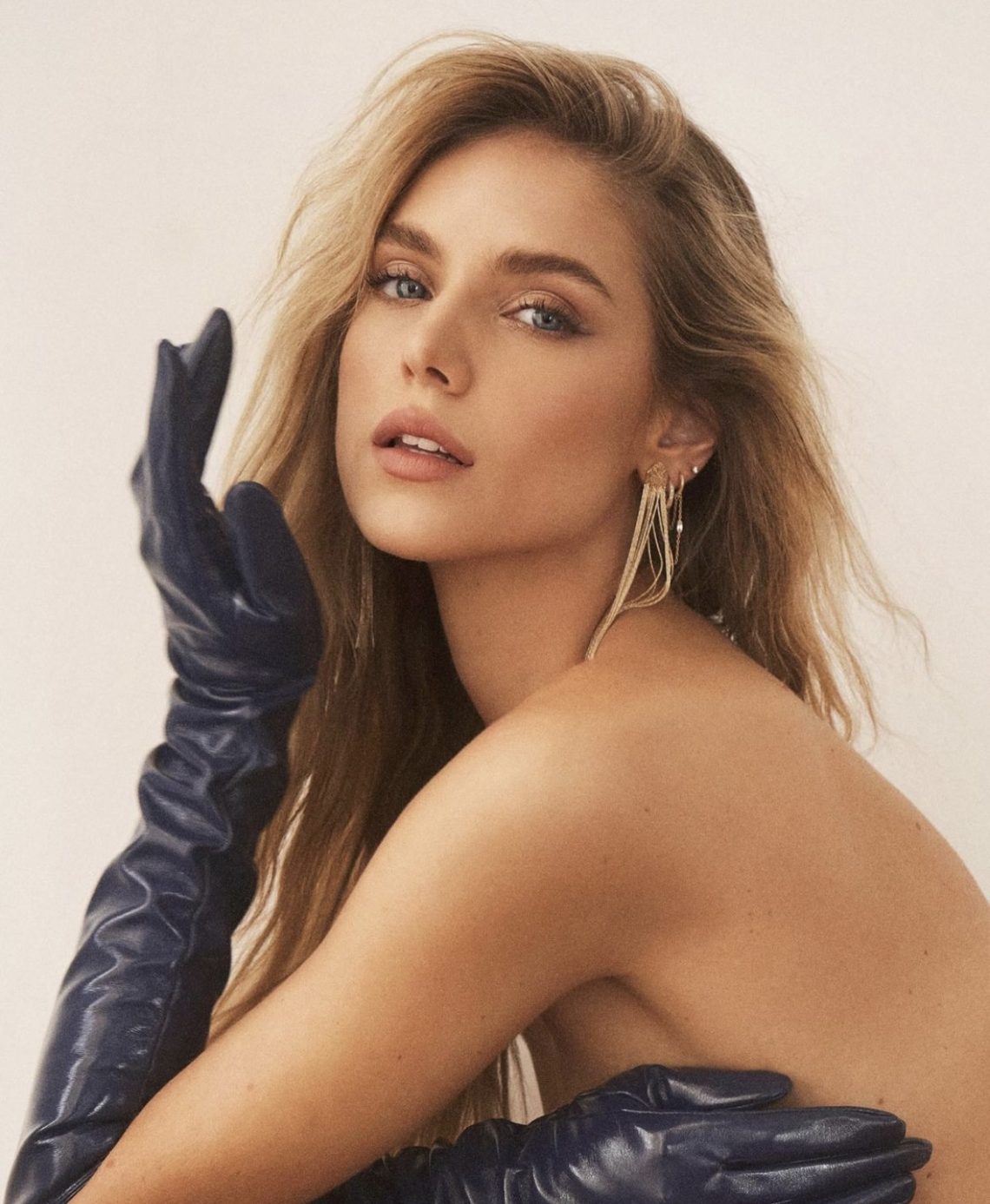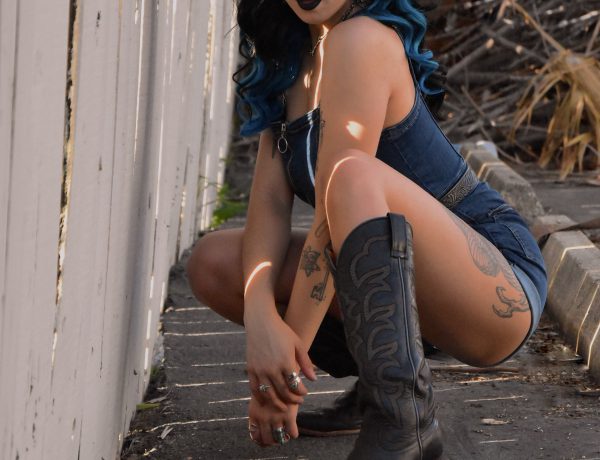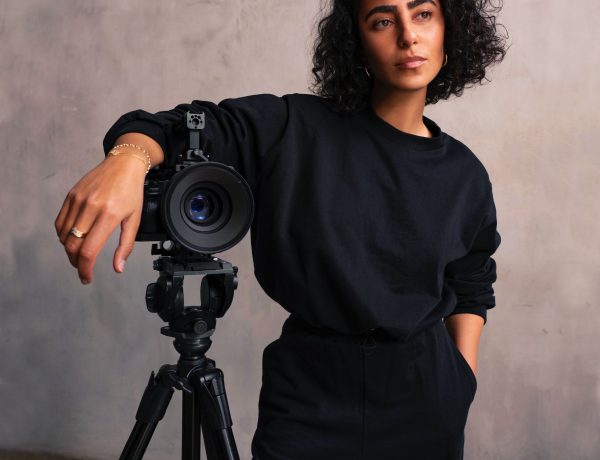Few people have the opportunity to meet their idols. Fortunately for Kari Riley‘s budding writing career, she was one of the rare exceptions. “With my book Through the Blues, it kind of just fell into my hands. I never really planned on writing a book,” she admits. “One of my favorite poets, Christopher Poindexter, published a new book and I went and bought it and I loved it. I DMed him on Instagram to say, ‘Hey, I just wanted to let you know I love your new book. It is super inspiring. It inspires me to write and to feel.’ And he DMed me back and he was super nice and we became Instagram friends. He followed me back and a couple months later, he told me, ‘I’m starting a publishing company and I would love to publish you.’ I wasn’t seeking this, but somebody who I really admire wanted to publish me. So I was really excited and that’s how writing the book came together.”
Writing served as a crucial outlet for Kari to navigate her emotions, especially as someone who had faced the often superficial world of modeling from a tender age. “I did my first photo shoot at age 11. A former model and aspiring photographer scouted me at the pool. Initially, I think it just felt good to be recognized for something. I tried every sport, every dance class, every instrument, and nothing stuck with me the way modeling did. The consequences were a double edged sword that went right through my confidence. On one end, it made me feel on top of the world. It made me feel beautiful and desired and ideal. On the other end, it makes you feel judged and rejected and inadequate at times. Fourteen years later, this hasn’t really dissipated,” she laughs. “There are times that I do feel confident and I do feel experienced and I feel like the best of my trade.
And then there are other times where my thoughts spiral with imposter syndrome and I think, ‘Am I even pretty?’ I feel like a lot of it just stems from the dissonance of, for example, you observe this beautifully retouched product photo and then what I see in the mirror is a contrast. You know, it’s always a contrast with modeling. There are some clients I meet who adore me and they want to rebook me and then there’s some clients you meet where you go in for a casting and they turn you away before you can even say hello. It’s very black and white. It pulls your brain in different directions and I think that’s the main consequence. There are good consequences and negative ones.”
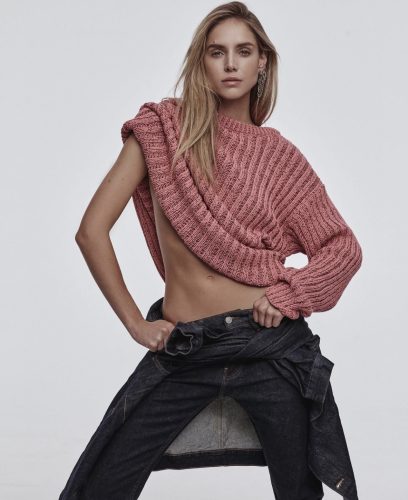 The overemphasis on outward appearance tainted her self-perception, moments of self-doubt that are predictably amplified by platforms like Instagram. “On an everyday basis, using social media makes even the strongest of us question our value and makes us pick ourselves apart, simply due to how other people look. Comparison is really the enemy of growth because you can’t go upward if you’re constantly looking left and right. Now take all of that anxiety and apply it to your career, which you depend on for your money and your survival. Eighty percent of that comes down to qualities that you have no control over, things you cannot change about yourself. It makes you feel like you’re innately unworthy to succeed because in most other career paths, you typically have a little bit more control over your ability to do a job. Whereas in modeling, I’m not going to be able to change my height or the width of my hips, or these are all things that are not in my control. I feel like those feelings bleed into every part of your life. You’re no longer invited to parties because of your personality, you’re invited to parties because of how you look. And if you aren’t invited, then you’re convinced that it’s because I’m not skinny enough, I’m not tall enough, my lips aren’t full enough, my nose look so fucking weird on my face. It’s this spiral of thoughts and you start to perceive yourself as an object that just needs constant adjusting and tweaking to be valued. It’s extremely toxic for your emotional self to just constantly be thinking that your value is external.”
The overemphasis on outward appearance tainted her self-perception, moments of self-doubt that are predictably amplified by platforms like Instagram. “On an everyday basis, using social media makes even the strongest of us question our value and makes us pick ourselves apart, simply due to how other people look. Comparison is really the enemy of growth because you can’t go upward if you’re constantly looking left and right. Now take all of that anxiety and apply it to your career, which you depend on for your money and your survival. Eighty percent of that comes down to qualities that you have no control over, things you cannot change about yourself. It makes you feel like you’re innately unworthy to succeed because in most other career paths, you typically have a little bit more control over your ability to do a job. Whereas in modeling, I’m not going to be able to change my height or the width of my hips, or these are all things that are not in my control. I feel like those feelings bleed into every part of your life. You’re no longer invited to parties because of your personality, you’re invited to parties because of how you look. And if you aren’t invited, then you’re convinced that it’s because I’m not skinny enough, I’m not tall enough, my lips aren’t full enough, my nose look so fucking weird on my face. It’s this spiral of thoughts and you start to perceive yourself as an object that just needs constant adjusting and tweaking to be valued. It’s extremely toxic for your emotional self to just constantly be thinking that your value is external.”
Kari began the slow process of nurturing her self-esteem by adopting the mantra “pretty is not my purpose.” She was touched by how her poems were not only moving others, but building a community. “That small phrase hit me in the midst of writing my book. It kept me going and it really changed my mindset and carried me through. I first recognized this phrase when friends and strangers on the internet told me how much one of my poems resonated with them and how it made them feel less alone and even hopeful. I could feel deep down that in the smallest of ways I impacted somebody. I’m a people person and when I connect with somebody on a deep level. I feel full. I enjoy giving advice, I enjoy showing up for people, being the friend that helps, being the shoulder for people to cry on.” In her mind, that closeness should be visceral and universal. “I just love the art of human connection. My purpose is to feel and to empathize and to give more to people than a pretty face. I don’t want people to see my beauty. I want them to feel it. And to me that feels like my purpose. It’s also a reminder to myself that I’m not just a model. I’m not just an object and I have more to give. Honestly, nothing has helped me more in releasing the importance of my outer beauty.”
Through the Blues is a radical and rebellious act of self-liberation and self-love. “A big part of my book is emphasizing on the fact that we are not meant to be put in boxes. That doesn’t just apply to somebody like me who’s a model. Why can’t an athlete love poetry? You can be more than one thing and you don’t have to be in the box that society puts you in.” As we know, the book almost never came to be. “Through the Blues was an accident baby, if you will, because I never planned on writing the book. I released it for one reason and that was in hopes that at least just one person would resonate with it. Just one. That’s all I needed. One person would resonate with it and it would help change their way of thinking for the better. It was never for likes or money or recognition at all. It was also to have something tangible for myself.” Her work is in many ways a poignant tribute to the age-old process of falling in and out of love and the lessons we learn along the jagged path back to who we are meant to become. “The book leads you through a journey of self that I think we all go through at least once in this life. For me, I’ve been through it many times,” Kari says with a grin. “It’s the cycle of you fall in love, which is the first section, you get heartbroken – the second section – and the third section is you learn self love. In the last section, you understand the bigger picture. It’s a circle. It’s a cycle that we all go through and it repeats itself in life in the most beautiful way. Each hardship offers you an opportunity to become a new elevated, transformed version of yourself. In this case with the book, it applies to love in the beginning, but this cycle can be applicable to anything in your life that you value and have attachment to that is somehow taken from you or broken or something that hurts you. And you have to learn to relove yourself and see the bigger picture and how it can come full circle.”
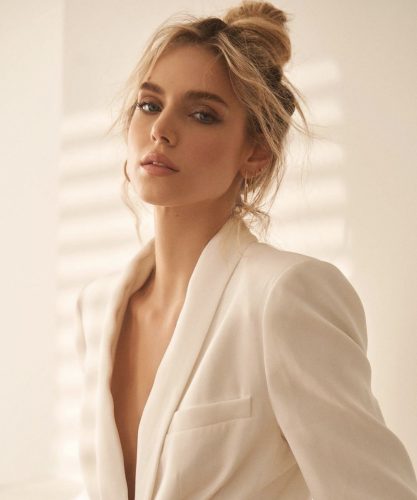 She knows that poetry is an eternal salve for her soul. “I think poetry softens the edges. It can make even the most devastating circumstances somewhat beautiful. I think my favorite thing about it is how each person can attach a different story or emotion to the same poem and have a completely different meaning. I think that that’s beautiful because it shows that poetry is a guide for your subconscious to open up your emotional body and experience vulnerability wherever you may need it most.” Writing provided her the space for the tender self-exploration that modeling denied her during her formative years. “Modeling forced me to build up a wall and guard myself, especially when I moved to LA. I’ve always been a really sensitive person. I was a very sensitive child and I was faced with a cold, judgmental world filled with rejection when I started to seriously model. There was no room for mistakes or flaws and perfection was expected. In contrast, poetry is all about imperfection. It’s allowed to be confusing and flawed, and that’s what makes it alluring and beautiful. It’s not interesting because it is without flaw. It is interesting because it is flawed.” Just the simple act of reading contains countless opportunities to experience joy. “I love to read a poem and see that it’s using weird metaphors or the lines don’t make sense or you have to figure out the rhythm. And you just get to put your own story to it. It’s that imperfection that makes it so special. For me, coming from a world where perfection is, like I said, expected, it’s a very beautiful contrast.” Kari underscores to her readers that being true to yourself should transcend all else. “Allow yourself to feel and don’t restrict yourself to be what society expects of you. You’re allowed to be multifaceted. You’re allowed to be flawed. I want my book to remind people that you are a spirit inside of a body, not a body with a spirit. And I think that’s super important to remember.”
She knows that poetry is an eternal salve for her soul. “I think poetry softens the edges. It can make even the most devastating circumstances somewhat beautiful. I think my favorite thing about it is how each person can attach a different story or emotion to the same poem and have a completely different meaning. I think that that’s beautiful because it shows that poetry is a guide for your subconscious to open up your emotional body and experience vulnerability wherever you may need it most.” Writing provided her the space for the tender self-exploration that modeling denied her during her formative years. “Modeling forced me to build up a wall and guard myself, especially when I moved to LA. I’ve always been a really sensitive person. I was a very sensitive child and I was faced with a cold, judgmental world filled with rejection when I started to seriously model. There was no room for mistakes or flaws and perfection was expected. In contrast, poetry is all about imperfection. It’s allowed to be confusing and flawed, and that’s what makes it alluring and beautiful. It’s not interesting because it is without flaw. It is interesting because it is flawed.” Just the simple act of reading contains countless opportunities to experience joy. “I love to read a poem and see that it’s using weird metaphors or the lines don’t make sense or you have to figure out the rhythm. And you just get to put your own story to it. It’s that imperfection that makes it so special. For me, coming from a world where perfection is, like I said, expected, it’s a very beautiful contrast.” Kari underscores to her readers that being true to yourself should transcend all else. “Allow yourself to feel and don’t restrict yourself to be what society expects of you. You’re allowed to be multifaceted. You’re allowed to be flawed. I want my book to remind people that you are a spirit inside of a body, not a body with a spirit. And I think that’s super important to remember.”
Past events can haunt us, but for Kari, poetry has given her an invaluable opportunity for clarity. “I think my best work was written within reflection of a situation, especially after time. I can write in the moment, but a lot of times when I’m reflecting, I feel like I just have a better perspective. I’ll give you an example. There was one partner that I just couldn’t seem to get over after we broke up and suddenly one night in the middle of the night, I just popped out of my bed and I ran and grabbed my journal and I sat on my kitchen floor and I wrote what is now a three page spread in my book. (It’s pages 147 through 149 if you’re interested.) I made zero edits to it. I changed zero lines. It is exactly how it was coming from my heart in that moment. And the moment I finished it was the exact moment the clouds cleared for me and I saw it for what it was, and I moved on.” New incarnations of wisdom are perennially waiting to be found. “Even now, I read my work back and I gain more clarity, sometimes on the same situation. And sometimes I’m able to apply my old work to new situations. I feel like poetry is really just the best tool for reflection in general.”
Kari’s writing will continue to ground her through the ebbs and flows of change. “I don’t think that my true sense of self will ever be crystal clear and I’m not sure that I want it to be, because that’s the point of life, isn’t it? Nothing has permanence and we are all always changing and it’s the experience of this change that feels like living. But poetry will always feel like a guide that helps me give meaning to the change.” Unpredictable and imperfect though life may be, Kari will be there with her pen at the ready.
Read more Celebrity Interviews on ClicheMag.com
Kari Riley Muses on Heartbreak and Healing in Her Poetry Book, “Through the Blues.” Photo Credit: Caleb & Gladys (Pictures 1& 3), Lena Melnik.

